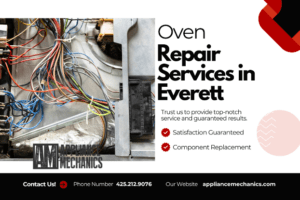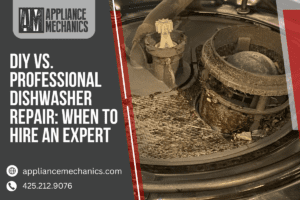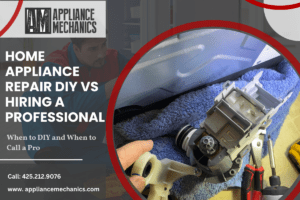Introduction to Cost-Benefit Analysis in Appliance Repair
Table of Contents
When one of your home appliances stops working, it can be a tough decision to make – should you try to fix it yourself or hire a professional? In situations like these, a cost-benefit analysis (CBA) can be a helpful tool to evaluate the decision from a financial perspective. A CBA involves considering the costs of parts, the time and effort it would take to repair it yourself, the tools you would need, and any potential future repairs against the price of hiring a professional to fix the issue. A CBA also considers non-financial factors such as convenience, safety, and warranty implications. By using this method, you can ensure that you make an informed decision that aligns with your budget and personal preferences.
Understanding the Basics of Home Appliance Repair
Before considering whether to tackle an appliance repair yourself or hire a professional, it’s important to grasp the fundamentals:
- Identify the Issue: Determine what isn’t working on your appliance. Look for obvious signs like leaks, noises, or performance issues.
- Safety First: Disconnect the appliance from power before inspecting it. Understand basic electrical safety to prevent shocks.
- Consult the Manual: Refer to the manufacturer’s manual for troubleshooting tips and understand the appliance layout.
- Assessment of Tools: Ensure you have the necessary tools for the repair; some appliances may require specialized instruments.
- Replacement Parts: Know how to source the correct replacement parts, relying on model numbers and specifications.
- Technical Knowledge: Be aware of the basic technical aspects of your appliances so that you can follow repair instructions accurately.
- Limitations: Recognize when the repair is beyond your skill level to avoid causing further damage to the appliance or harming yourself.
The Pros of DIY Appliance Repair
✅ Cost Savings: You directly save on service fees when you tackle repairs, making it more budget-friendly.
✅ Learning Experience: DIY repairs provide a hands-on opportunity to learn more about your appliances work.
✅ Convenience: You can perform repairs on your schedule, avoiding the hassle of aligning with a professional’s timetable.
✅ Satisfaction: A feeling of achievement and empowerment comes with repairing something using your hands.
✅ Immediate Attention: You can address the issue immediately rather than waiting for a scheduled professional visit.
✅ Control: You oversee all aspects of the repair process, ensuring it meets your standards and preferences.
Required Skills and Tools for DIY Repairs
For successful DIY home appliance repairs, you’ll need:
- Basic technical skills: Understand appliance components and their functions.
- Troubleshooting abilities: Diagnose issues effectively using manuals or online resources.
- Electrical safety knowledge: Work safely with appliances that use electricity.
- Mechanical aptitude: Handle tools and assemble or disassemble parts with confidence.
- Patience and attention to detail: Carefully follow repair steps without rushing.
Furthermore, gather these essential tools:
- Screwdrivers (various sizes and types)
- Pliers (needle-nose and adjustable)
- Wrench set
- Multimeter for electrical testing
- Flashlight or headlamp
- Protective gear (gloves, goggles)
- Soldering iron (for circuitry repairs)
With these skills and tools, you can embark on basic repairs, but professional assistance may still be necessary for complex issues.
Calculating the Costs of DIY Repair
To assess DIY repair costs:
- Research Tools and Materials: Estimate the price of necessary tools and materials. This often includes parts, manuals, and safety equipment.
- Valuing Your Time: Reflect on the time commitment. Dedicate hours for researching, performing the repair, and possibly redoing the work.
- Potential Risks: Account for the risk factors. Mistakes can lead to more damage or reduced appliance lifespan, incurring additional costs.
- Efficiency Loss: Consider efficiency loss in the malfunctioning appliance. Improper repair might result in higher energy costs.
Warranty Voidance: Check warranty status. Unauthorized repairs may void warranties, leading to significant expenses if later professional service is needed.
Timing Considerations in DIY Appliance Repair
When you plan to repair home appliances yourself, consider:
- Time Investment: Assess the time you’ll spend researching, troubleshooting, and repairing. Can you spare evenings or weekends?
- Immediate Need: If the appliance is essential, like a refrigerator, can you afford the downtime while you learn and execute the repair?
- Learning Curve: Some repairs have a steep learning curve. If this is your first repair attempt, it may take significantly longer.
- Tool Availability: Ensure you have the necessary tools beforehand, as acquiring them could add delays.
- Diagnosis Time: Proper diagnosis is critical. With inexperience, identifying the exact problem may take time, prolonging the repair.
- Multiple Attempts: You might not get it right the first time, so additional sessions are required.
- Parts Ordering: If parts are needed, shipping times can cause significant delays.
- Project Scaling: A simple fix can sometimes uncover more complex issues that extend repair time.
Weigh these factors against the urgency, and you’ll have a clearer picture of whether DIY is the right choice.
The Advantages of Hiring a Professional Repair Service
When you hire a professional repair service, you gain several significant benefits:
- Expertise: Professionals are trained to handle various appliance issues, ensuring a correct and swift diagnosis and repair.
- Time-saving: Expert technicians can complete the job much faster than a DIY attempt, freeing up your schedule.
- Tools and Equipment: Professionals come equipped with specialized tools you may not have.
- Warranty and Guarantees: Many services offer warranties on their repairs, giving you peace of mind.
- Safety: Professionals understand the safety protocols to prevent accidents, safeguarding you from electric shocks or gas leaks.
Assessing the Costs of Professional Appliance Repair
When contemplating professional appliance repair, you must consider several cost factors:
- Service Call Fee: This initial charge covers the technician’s visit to diagnose your appliance issue. Prices vary depending on the company and region.
- Labor Costs: Technicians charge hourly or flat fees based on the job complexity.
- Parts: If your repair requires replacement parts, you’ll pay for the components and their installation.
- Warranty: Verify if the repair service includes a warranty, which could save you future repair costs.
Additionally, factor in potential indirect costs such as time taken off work or temporary appliance rental.
Professional Expertise and the Quality of Repair
When it comes to repairing home appliances, it’s important to consider your level of expertise. While you may be handy, professionals possess specialized knowledge and tools to ensure proper repair.
- Training: Experts have specialized training and certifications that you likely need to improve.
- Experience: They’ve repaired numerous appliances, giving them an edge in diagnosing and fixing complex issues.
- Tools: Technicians use the latest tools and technologies for accurate repairs.
- Quality: A professional repair often means a higher standard of work, with genuine parts and warranties.
- Safety: Experts understand risks and employ methods to repair appliances without causing harm to themselves or your property.
In short, their know-how can ensure a lasting repair, safeguarding your appliance and wallet.
Warranties and Guarantees: Professional vs. DIY Repair
When considering whether to tackle a home appliance repair or hire a professional, you should evaluate the impact on warranties and guarantees.
- Professional Repair:
- Utilizing a certified technician often maintains the manufacturer’s warranty on your appliance, ensuring any ongoing protection isn’t voided.
- Most professionals offer guarantees on their work, providing added assurance and recourse should an issue arise post-repair.
- DIY Repair:
- Attempting repairs yourself can void existing warranties, leaving you without a safety net if additional issues occur.
- Guarantees do not cover your work, meaning you bear the cost of any immediate or future problems related to the repair.
Safety Considerations: DIY vs. Professional Repair
- Risk Assessment: Assessing the risk is crucial. You are responsible for your safety with DIY repairs. Professionals have the training to mitigate risks.
- Electrical Hazards: With DIY, you face the real danger of electric shock. Technicians are equipped with the proper tools and knowledge to handle such hazards.
- Gas Appliances: Mistakes with gas can be fatal. Professionals know the protocols to prevent leaks and explosions.
- Warranty: DIY repairs might void warranties, while professionals usually offer a service guarantee.
- Long-term Safety: An improper fix can lead to future hazards. Professionals ensure a repair is reliable, preventing potential safety issues.
Long-Term Impact of Repair Choices on Appliance Lifespan
The long-term effects can vary when you opt for DIY repairs on your home appliances. While initially appearing cost-effective, you need more expertise to avoid causing further damage or reducing the effectiveness and lifespan of the appliance. Conversely, engaging a professional ensures that repairs are thorough, with the appropriate parts and techniques to extend the unit’s longevity. Professionals typically warranty their work, adding peace of mind and potential cost savings should issues arise post-repair. Thus, your choice of repair could significantly influence your appliance’s durability and future performance.
Decision Factors: When to DIY and When to Call a Pro
When deciding whether to repair a home appliance yourself or hire a professional, consider these factors:
- Complexity: DIY can save money if the repair is simple, like replacing a filter. For complex issues, a pro is advisable.
- Safety: Electricity and gas appliances pose serious risks. If you need more confidence, call a professional.
- Tools: Specialized tools may be required. If you don’t own them, consider the cost of buying versus hiring.
- Time: Analyze if the time spent learning and repairing is worth it compared to a professional’s quick fix.
- Warranty: DIY repairs might void warranties. Check your terms before proceeding.
- Cost: If the professional repair cost is close to the appliance’s replacement value, it may be practical to replace rather than repair.
When facing appliance failures, your decision to opt for DIY or professional help weighs heavily on cost-benefit analyses. Keep in mind not only the immediate costs but also the long-term implications. DIY solutions require your time and might risk further damage without proper expertise. Professionals, while more expensive upfront, offer knowledge and guarantees. Critically evaluate your skill level, the complexity of the repair, potential savings, and risks. Your goal is to achieve a functional appliance with financial prudence. Make your choice with foresight, and ensure it aligns with your long-term home maintenance strategy.
Looking for a trusted and experienced appliance repair company? Look no further than Appliance Mechanics! Our team of skilled technicians is dedicated to providing fast and reliable repair services for all your household appliances. Whether it’s a broken refrigerator, malfunctioning oven, or faulty dishwasher, we have the expertise to get your appliances back in working order. Contact us today at 425.212.9076 or Text 425.470.6059 to schedule your appointment and experience our top-notch service!
FAQ's
1. What are the primary factors to consider when deciding between DIY repair and hiring a professional for home appliance repair?
The decision between DIY repair and hiring a professional depends on factors such as your skill level, the complexity of the appliance issue, safety concerns, warranty coverage, and the cost of parts and labor. Evaluating these factors can help you make an informed choice.
2. How can I assess whether a home appliance repair suits a DIY approach?
Assessing your skill level and comfort with tools, as well as the complexity of the repair, is crucial. Simple tasks like replacing a broken door handle or unclogging a drain may be feasible for DIY. At the same time, more complex issues like electrical or gas-related repairs are best left to professionals for safety reasons.
3. What are the potential risks of attempting DIY appliance repairs?
DIY repairs can pose risks such as personal injury from mishandling tools or electrical components, exacerbating the appliance issue due to lack of expertise, voiding warranty coverage by unauthorized repairs, and potentially causing damage to the appliance or property. It’s essential to weigh these risks against the potential cost savings.
4. How can I determine if hiring a professional for appliance repair is cost-effective?
Consider factors such as the cost of parts and tools needed for the repair, the value of your time and effort, potential additional costs if the repair goes wrong, and the expertise and efficiency offered by professional technicians. A cost-benefit analysis can help determine whether the investment in professional repair outweighs the DIY approach.
5. Are there situations where hiring a professional for appliance repair is clearly advantageous?
Yes, situations such as complex repairs involving electrical, gas, or refrigerant systems, repairs covered by manufacturer warranties or extended service plans, time-sensitive repairs needed for essential appliances, and instances where safety or expertise is paramount are all scenarios where hiring a professional is often the wisest choice.



